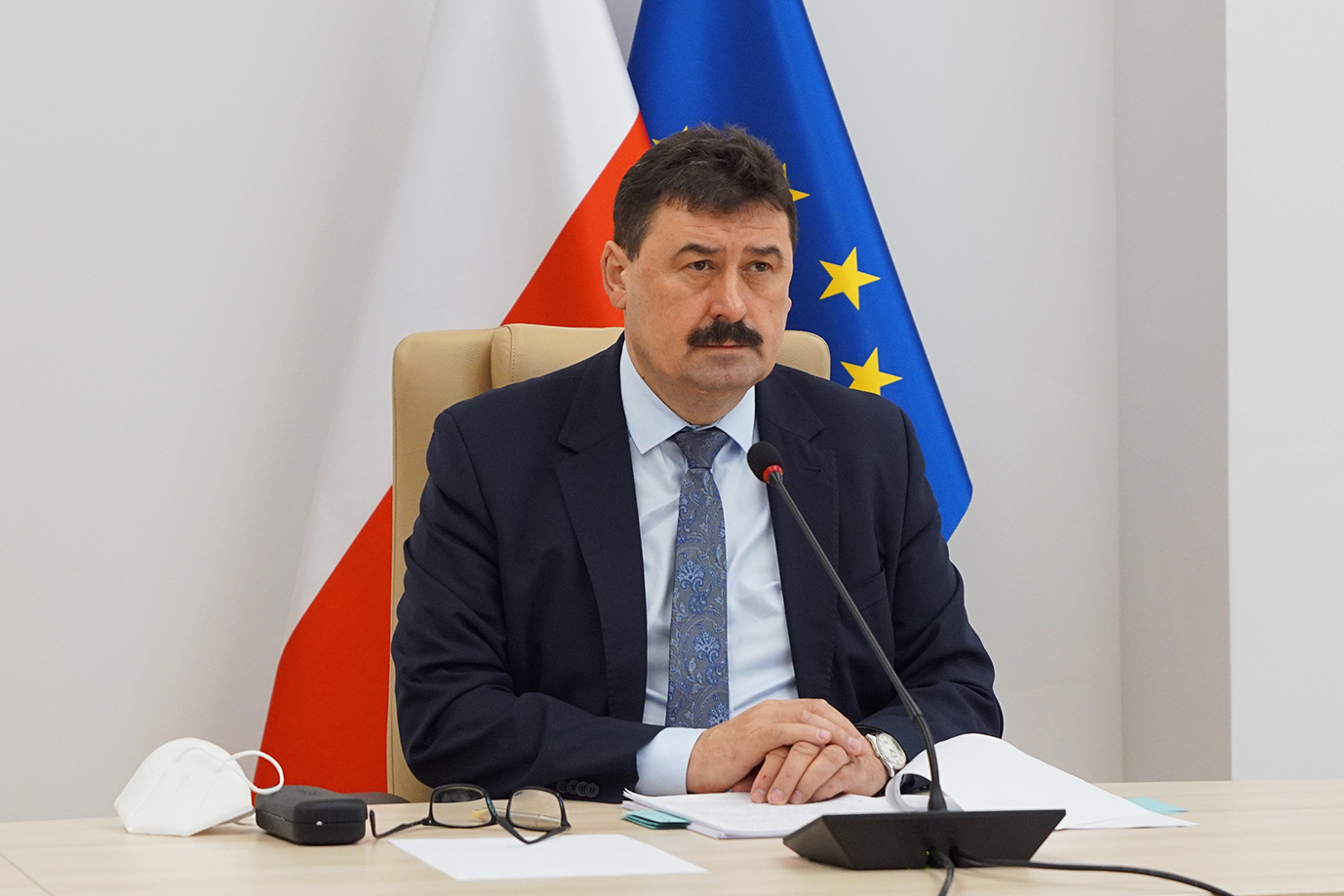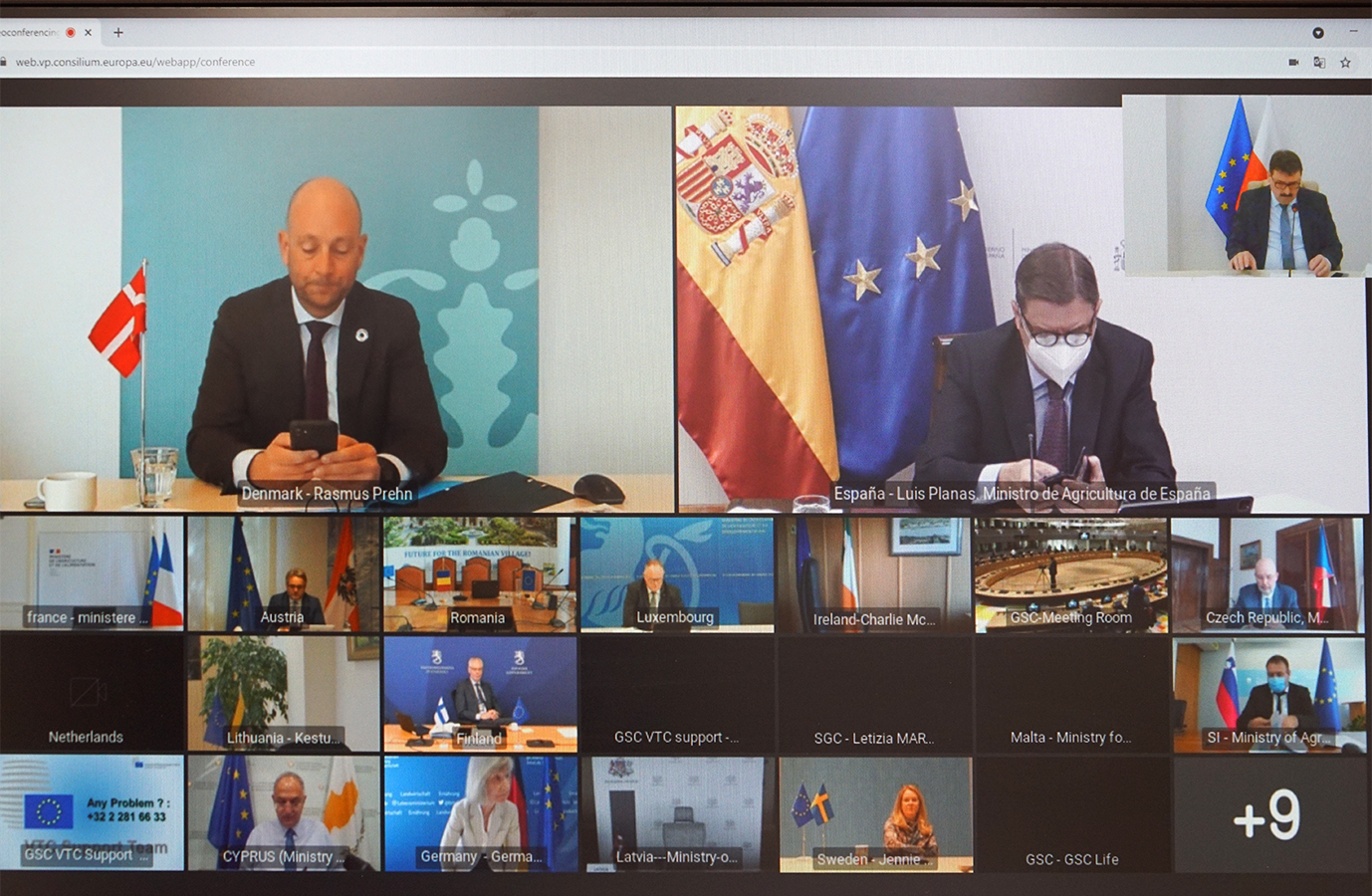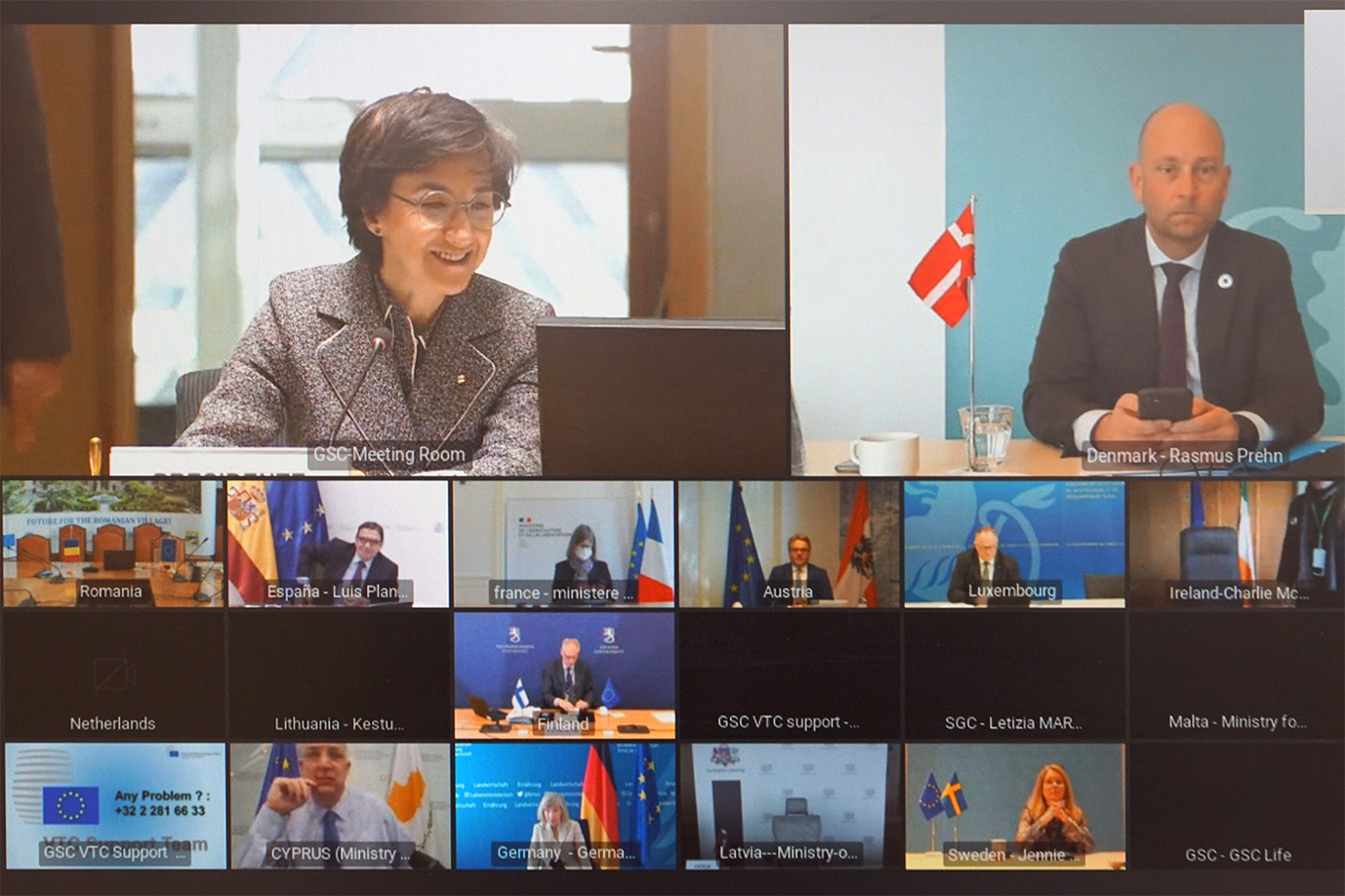Video Conference of EU Ministers of Agriculture
27.04.2021
An informal video conference of EU Ministers of Agriculture took place on April 26, 2021. The Polish delegation was led Ryszard Bartosik – the Secretary of State. The Ministers discussed the situation on agricultural markets, the CAP, animal welfare and trade policy.

Situation on agricultural markets
An important point of the ministerial discussion was the situation on agricultural markets in connection with the COVID-19 pandemic and Brexit, as well as market disturbances occurring in the EU Member States.
Ryszard Bartosik informed that in Poland, apart from the COVID-19 pandemic, there are also other factors such as avian influenza and ASF that have a negative impact on agricultural markets. – Therefore, some markets will need EU support in the near future – said the deputy minister.
The head of the Polish delegation presented the current situation on individual markets in Poland.
- On the pigmeat market, rising cereal and feed production costs are aggravating the possibility of recovering from the drastic price decline in 2020. In areas affected by ASF-related restrictions, producers are experiencing problems when selling pigs and are receiving prices lower than market prices.
- On the poultry market the situation is still difficult, despite the increase in purchase prices. This is mainly due to an increase in feed prices and the occurrence of new outbreaks of avian influenza, which limits export opportunities.
- Constraints and restrictions in the operation of the HoReCa sector, due to another wave of the COVID-19 pandemic, have caused significant problems for many fruit and vegetableproducers. It is estimated that as a result of restrictions introduced, 80% of potatoes intended for sale in the HoReCa sector in Poland were not managed. Poland has proposed to the EC that potatoes may be provided to biogas plants or for other industrial purposes, e.g. for processing to produce spirit for disinfectants. Croatia supported the Polish request for such potato management.
Answer from the European Commission
In response to the requests of the Member States for support in the difficult situation of, for example, for fruit and vegetable sectors, also affected by spring frost, the Commission declared that the current situation would be monitored. At the same time, it informed that in view of the extensive losses in agriculture, the budgetary framework is limited.
Significant financial assistance in the short term would require the mobilisation of funds from the crisis reserve, which would mean that direct payments received by all farmers would have to be reduced. According to the EC, improvement in the situation in this sector should be seen in the broader context of improvement in the economic situation and lifting of pandemic-related restrictions.
CAP reform
Opening the discussion on the reform of the Common Agricultural Policy, the Portuguese Presidency confirmed that the negotiations with the European Parliament on the three-regulation package could be concluded in the first half of this year.
The European Commission also expressed support for the plan to reach an overall agreement in May this year.
The Commission is under a very high time pressure to reach agreement at EU level – to allow the Member States to complete the necessary legislative processes at the national level.
Deputy Minister Bartosik presented the position of Poland regarding the negotiated package. As far as the “green architecture” is concerned, Poland can support the compromise proposal to gradually raise the spending limit for eco-schemes. It is important to preserve the Council's approach to the method for setting this limit on the basis of allocation to direct payments before the transfer of funds from Pillar II. Poland can accept the account to be taken of 60% of support for areas with natural constraints when clearing the limit of 30% of CAP pillar II expenditure for environmental and climate objectives.
Poland supports the compromise proposal on good environmental practices (GAEC 8 crop rotation on arable land) and on maintaining the exemption from GAEC 8 and GAEC 9 for farms of up to 10 ha. However, we do not support the Presidency's proposal for GAEC 9 (establishment of non-productive areas) as it will complicate the implementation of this standard by reducing flexibility for the Member States. Furthermore, the proposal to compulsorily allocate at least 3% of arable land to non-productive areas may lead to the need to take the land out of production.
As regards the targeting of support, Poland may agree to the obligatory application of the definition of the active farmer, provided that farmers receiving up to EUR 5,000 of direct payments will be considered as active. We also expect that when verifying the “active farmer” condition, it will not be necessary to verify whether the applicant is affiliated with other entities and whether one of those entities is an active farmer. The application of the payments for small farms should be optional for Member States.
Poland supports the Council's position on the level of financing of production-related payments, i.e. 13% of the envelope of direct payments +2% for support to protein crops. We call for the continued transitional national support. We want to keep that support constant and that the base period updated. We agree with the Parliament's proposal for the transitional national support.
Animal welfare
The Commission presented the results of the evaluation of the EU Strategy for the Protection and Welfare of Animals (2012-2015).
The Member States emphasised the need to improve welfare and to respond to consumer expectations in this regard. Several countries stressed the need for action in the area of long-distance transport of live animals. At the same time the discussion highlighted the need to apply the same animal welfare requirements in third countries.
Under this agenda item, a request from the German delegation concerning the labelling of foodstuffs containing eggs in the context of laying hen farming practices was also discussed. Currently, there is no obligation to label processed foods containing eggs as an ingredient. The labelling proposed by Germany is intended to take account of how the laying hens are kept. According to Germany, in view of the aim of the Farm-to-Fork strategy of improving animal protection and welfare, consumers should be provided with information on the identification of the type of farming and egg production when choosing their products. The German proposal was supported by several Member States. During the discussion, the Ministers highlighted the need to avoid an additional administrative burden for producers and to maintain competitive conditions on agricultural markets. Minister Bartosik stressed that any increase in consumer information on labels must allow for the possibility of obtaining this information via electronic means.
Commercial issues
The Ministers held a strategic discussion on the impact of the revised EU trade policy on agriculture, bearing in mind the objectives of the CAP and the increased environmental and sustainability ambitions.
- A key challenge in Poland's view is the ability to effectively enforce commitments made by partners under agreements with the EU and to reduce persistent trade barriers. We appreciate the efforts planned and already made in this direction, including the establishment of a dedicated post within the Commission to deal with these matters. We hope that it will bring the expected results – said Ryszard Bartosik.
The Deputy Minister also reminded that Polish agri-food export is often limited or even blocked by unjustified barriers applied by trade partners. These include both non-tariff barriers, notably in the form of SPS (sanitary and phytosanitary) measures, and tariff barriers such as safeguard or anti-dumping duties.



